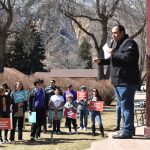Ski Corp. pledges 3-year, $1-million-per-year contribution to support proposed RTA
Commitment would 'automatically terminate' if lift-tax question is on November ballot

John F. Russell/Steamboat Pilot & Today
After backing away from a 20-year, $1-million-per-year funding commitment to support a proposed Regional Transportation Authority, the Steamboat Ski & Resort Corp. late Wednesday offered a three-year, $1-million-per-year commitment that would “automatically terminate” should the city decide to put a lift-tax question on the November ballot.
Following weeks of negotiations, Steamboat Springs and its neighboring jurisdictions have reached a tentative consensus to pursue formation of an RTA based on the newly revised Ski Corp. funding pledge. The unified agreement follows a tense Aug. 12 formation committee meeting, where frustrations over Ski Corp.’s sudden withdrawal of its 20-year, $1-million-per-year funding pledge erupted into pointed exchanges among municipal, county and Ski Corp. officials.
At that meeting, the proposed RTA’s future appeared uncertain as committee members debated whether a temporary, one-year, $1-million Ski Corp. commitment would be enough to keep an RTA question on track for the November ballot.
During Tuesday’s Steamboat Springs City Council meeting, at which council members Bryan Swintek and Steve Muntean were absent, city leaders were forced to weigh whether an RTA formation question remained worth pursuing in November given the reneged 20-year funding pledge — and whether to use a proposed lift-ticket tax as a potential alternative funding mechanism to ensure RTA viability.
Council’s response: frustration, skepticism
Exasperation among the five City Council members present at Tuesday’s meeting — with the exception of Councilor Michael Buccino, who urged his fellow councilors to prioritize maintaining a cooperative relationship with Ski Corp. — was palpable.
Councilor Dakotah McGinlay pressed Ski Corp. President and COO Dave Hunter with pointed questions about the delays and the Ski Corp. funding-approval process.
“There was a similar kind of sentiment that I felt at the middle to the end of the (lift tax) negotiations that you all were kind of pushing and pushing to the end of the deadline, and then we would extend, and you’d push again, and we would extend, and it was kind of frustrating, that side of it, I will say,” said McGinlay. “And I’m feeling that again right now.”
“I know that you all want to be a good partner in this, but would you want your good partner negotiating in faith to, like, push things to the very last minute in these really big community decisions?” she asked Hunter. “Would that feel good for you all?”
“I don’t think it felt good to either side,” Hunter responded. “I think it’s important to take more time to have the right deal than to force the wrong deal for our community, for our resort, and for this City Council.”
“I feel like we’re kind of forced right now,” McGinlay replied.
Hunter said he “disagreed” and reiterated points he made at last week’s formation committee meeting: that his team simply did not have enough time to vet a 20-year deal with Ski Corp. parent company Alterra Mountain Co. — despite it being discussed among RTA stakeholders for over a year. Hunter emphasized the importance of “standing up the RTA” with a $1 million upfront offer as proof of “good faith.”
Buccino recapped the formation committee meeting to council and said he was satisfied with Ski Corp.’s scaled-back $1 million, one-year pledge, and that it is “ultimately up to the citizens to pay for the RTA.”
A consultant for the RTA formation committee, Bill Ray, noted that in early July, he and the committee’s legal team “took it upon (them)selves” to draft the 20-year pledge agreement that had been discussed for so long.
“We ourselves were wondering, ‘Where is this pledge agreement, and when is it coming?'” said Ray. “We were getting close to the IGA (intergovernmental agreement) deadline, so we took that upon ourselves to start that drafting process.”
Hunter responded to Ray’s comment by saying that “it is not normal course of business for the pledgee to draft (their) own agreement.”
Councilor Amy Dickson expressed frustration at being “put in this position,” suggesting the council should not shoulder blame for Ski Corp.’s change of heart.
“I’m mad that City Council is now the ones being portrayed whether this is going to move forward or not, when in reality, it’s Ski Corp.,” said Dickson. “This is not on us, it’s on Ski Corp, why we’re here tonight, and it’s completely unfair to bring this forward … it kills me, because we need (the RTA) so badly, and I’m just mad.”
Councilor Joella West struggled for a “polite adjective” to describe her feelings about the Ski Corp.’s decision. Council President Gail Garey said simply: “Council is absolutely not happy about being in this position.”
Commissioner Sonja Macys, representing Routt County on the formation committee, outlined the region’s long and sometimes bruising history with the resort on major funding pledges, reminding council that “there is a history … of them making these commitments and not following through.”
Macys confirmed that the county now wanted a three-year deal with Ski Corp. and that responses from the other jurisdictions were mixed.
With the lift tax ballot question later in the meeting’s agenda, council opted to move forward with approving the IGA that reflected Ski Corp.’s reduced offer, but signaled that discussions and potential action on the lift tax would continue as a critical fallback to sustainable funding for the RTA.
Lift tax: separate in theory, intertwined in reality
Though formally distinct from the RTA ballot question, the prospect of a lift-ticket tax loomed large throughout discussions as both a potential funding mechanism for the RTA and a point of contention that complicated negotiations with Ski Corp.
City Attorney Dan Foote explained that while the resort retains a right to terminate its recently signed $2.75 million annual contribution for Steamboat Springs Transit if a lift tax is imposed, termination would only be triggered if the tax is both approved by voters and subsequently imposed by the City Council.
During council’s Tuesday discussion, Buccino urged restraint, warning that pursuing a lift tax ballot question could “divide the community” and sow animosity toward the resort.
“I look at our sales tax budget in January and March, and we get 60% of our money because there’s a ski mountain in Steamboat Springs,” said Buccino. “They are providing a lot … I just can’t see myself supporting getting this to ballot.”
Dickson, Garey, McGinlay and West, however, implied that a lift tax, despite the executed contribution agreement for SST, may be a necessary backstop should longer-term funding commitments from Ski Corp. for the RTA remain in flux.
Near the close of the discussion, Hunter reiterated Ski Corp.’s commitment to the RTA and said that the company was now prepared to pledge $1 million for two years — an improvement from the one-year pledge, but falling short of the three-year commitment proposed by the county.
“Pursuing a (lift tax) ballot measure now after completing that process would undermine our partnership that we’ve built and could create long-term impacts that would not only affect our resort, this City Council and the city of Steamboat, but most importantly, our broader community,” said Hunter at the close of the discussion. “As a partner, I ask that you vote down this ordinance.”
Ultimately, council approved moving the first reading of lift tax ballot language, integrating provisions to reflect $1 million in funding for the RTA and creating safeguards for nonprofits that might be impacted by redirected community funds, as well as a sales tax rebate for locals. The measure passed 4-1, with Buccino as the sole dissenting vote.
Ski Corp. comes back with three-year, $1-million-per-year pledge
Just after 5 p.m. Wednesday, Hunter sent an email to the formation committee members with a newly drafted pledge of $1 million per year for three years, and committed Ski Corp. to “working in good faith” with the RTA board, once established, to continue negotiations of $1 million per year for the remaining 17 years.
The newly drafted pledge also stated that it will “automatically terminate” should the city decide to put a lift tax question on the November ballot.
A few hours later, Macys wrote to committee members announcing that the county commissioners would discuss the RTA ballot initiative at its Aug. 26 meeting, and that she would be recommending to commissioners Angelica Salinas and Tim Redmond that the county proceed with putting the question on the ballot in light of the new pledge.
Following a Thursday RTA conference call, Macys said in an interview that the Steamboat Springs City Council would hold a special meeting on Monday to decide whether to move forward with the RTA intergovernmental agreement given the new three-year pledge.
Whether all six member jurisdictions will proceed with an RTA formation question on their respective ballots — and whether the city will still refer a lift tax question to city voters — remains to be seen.

Support Local Journalism

Support Local Journalism
Readers around Steamboat and Routt County make the Steamboat Pilot & Today’s work possible. Your financial contribution supports our efforts to deliver quality, locally relevant journalism.
Now more than ever, your support is critical to help us keep our community informed about the evolving coronavirus pandemic and the impact it is having locally. Every contribution, however large or small, will make a difference.
Each donation will be used exclusively for the development and creation of increased news coverage.









